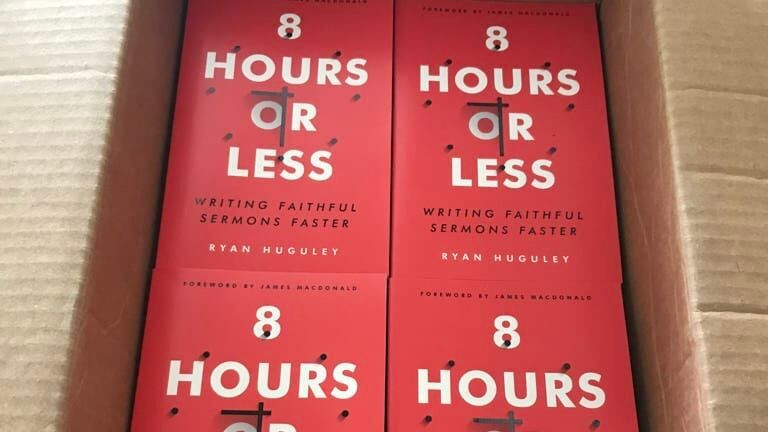8 Hours or Less: Writing Faithful Sermons Faster


I’m not happy about it, but my time is more limited than I’d like when it comes to sermon preparation. I used to spend up to twenty hours a week on preparing sermons. Now, out of necessity, I spend considerably less.
I was curious, then, to pick up Ryan Huguley’s new book 8 Hours or Less: Writing Faithful Sermons Faster. Curious, but also skeptical. Is it really possible to prepare a biblical, helpful sermon in that amount of time?
In the past two weeks, I’ve been challenged that I need to step up my sermon game. Preaching deserves our best energy, and shouldn’t be taken lightly. Our churches depend on the faithful preaching of God’s Word, and microwaving sermons is inexcusable. I’m cautious about any approach that dilutes the quality of preaching.
Huguley agrees. He’s not interested in providing shortcuts. He does want to help us avoid shortcuts and to be driven by daily deadlines that help us complete each task in the preparation process. “Where there is no deadline,” he writes, “there is no drive.”
The bulk of the book is a daily plan for writing the sermon:
- On Mondays, do exegesis and build the frame of the sermon.
- On Tuesdays, get feedback from others on the sermon frame.
- On Wednesdays, prepare the introduction.
- On Thursdays, prepare the conclusion.
- On Fridays, complete preaching notes.
- On Sundays, deliver the sermon.
Despite the tight timeframe, Huguley believes that most of us should write manuscripts. “You may not write a word-for-word manuscript—though I do commend this to new preachers—but you should write out the vast majority of what you plan to say. Roughly 90 percent of my sermon is written on the page.” Huguley doesn’t want us to skip steps or skimp in our preparation. He just wants us to spend our time wisely.
I appreciated a lot in this book. It provides clear direction on the steps that we can take in sermon preparation. I especially appreciated the Tuesday stage of getting feedback from others in sermon preparation. Many of us don’t involve others in the preparation process, and our sermons are poorer because of it.
I also appreciated that the book encourages us to spend two hours on the introduction and conclusion. This is more time than I currently spend. I think I’m going to take his advice and increase my time in this area.
I do have a few reservations. I wonder whether it’s possible to complete exegesis and build the frame of a sermon in two hours. I also wonder whether it’s possible to complete preaching notes, especially if it’s almost a full manuscript, in two hours. I think that his advice would work better for a seasoned preacher than a new one. I also don’t have five weekdays available: I work in another role for one day, and take Fridays as my day off, and need to modify his timeline for my schedule.
Still, I would recommend this book for experienced preachers. There’s enough in here to help those of us who have been preaching for a while to examine our progress so that we’re spending time on what matters most. Even if you don’t implement everything he writes, you will still benefit from his book.
Prepare a sermon in eight hours or less? Maybe not. But use your sermon preparation time wisely and well. This book will help you do that.
More from Amazon.com






